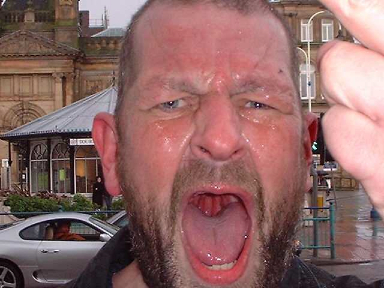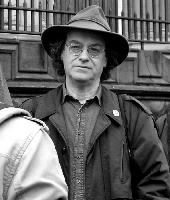Most Talk; Few Do Anything
November 20, 2010
 Shorty might have looked like this man. Kevin Annett relates what made him so angry.
Shorty might have looked like this man. Kevin Annett relates what made him so angry. by Kevin Annett
When I was still stupid, I kept hovering voyeuristically around homeless men and women, like all bourgeois radicals, from the safety of a salary.
Back then, at age 35, I happened to occupy a cozy sinecure called "Street Chaplain and Urban Ministry Development Worker" at a United Church tax haven and money laundering plant known as Fred Victor Mission in downtown Toronto. And I even learned a thing or two that year, in spite of my position.
I blame some of that on Shorty.
I literally stumbled across him one winter night in the shadows of City Hall, where he and some friends grouped around a hot air grate so they wouldn't die. Shorty was high on airplane glue, his preferred opiate considering its cheap availability. But the spindly man spurned the alcoholic haze of his sidewalk buddies and struck up a conversation with me about his time in Kingston penitentiary.
My Marxist tutelage years had taught me that lumpen proletarians like Shorty don't make revolutions: only sturdy, salaried industrial workers do. But as I demonstrated in my own life, anybody on a salary doesn't pose much of a threat, to anything. Shorty, on the other hand, had nothing to hang onto.
He actually took me up on my offer to come by the Mission for some lunch - since I assumed, naturally, that like me, his first concern would be for his stomach. The next day Shorty started dismantling my world.
I don't think we ever expect to have our minds turned inside out, and it's not something we can ever really prepare for. Denial of what we're experiencing is our first and best defense. But my desire to believe Shorty helped him outflank my barriers, and he did so with Napoleonic elan, simply by talking about his life.
What landed him in Kingston Pen was that he'd killed his old man after the guy had raped and tortured Shorty's mom to death with an electric cattle prod. Shorty was eighteen.
He hadn't needed much prompting to smash the guy's head in, since Shorty had been at the receiving end himself for many years. But Shorty's Dad was a local Freemason and an elder in the Anglican church, and friends with every cop in their New Brunswick town, so the judge rewarded the boy accordingly.
"Weren't a crime for the fucker to kill my mom. Me doing him in was" described Shorty as he piled in to cornbread and soup, and the Mission crowd ebbed and flowed around us.
Life in the Pen taught Shorty the joys of anal rape and daily beatings by the guards. His graphic description of both was not a titillation on his part, but something he did because he saw that I really wanted to know.
"They used us like fucking lab rats all the time" Shorty went on, picking his teeth.
"They'd let you off work detail if you signed up for the shots. Lots of guys did, at first. Until they started up chucking and dying off."
Medical experiments on inmates? I asked him. By who?
"Fuck, who" he snorted. "Who d'ya think?"
Shorty leaned back then, smiling toothlessly and gesturing at his gums.
"Weren't just the shots. They did this to me. Pulled every one of 'em. That army doctor who done it, you know, he said to me, 'Shorty, why the hell would you need teeth, where you're going?' ".
Shorty was in the Pen for twelve years, in time to somehow live through the big riot there in April, 1971 when the army got called in and opened fire on the cons, killing two of them.
"They blamed us, sure, but we couldn't stand their fucking tortures anymore, that shit for food, no sir. Fuck 'em. I stood up to those army boys and didn't flinch, no sir."
I noticed after awhile that people in the Mission were avoiding us, gaping at Shorty like he was still armed and dangerous, which of course he was. He noticed it and smiled.
"I ain't no fucking sheep, and they know it. These farm critters don't like a wolf on the premises."
I kept the door open for Shorty after that day, and invited him to our next Sunday "worship service" in the Mission lounge. He took enormous delight in disrupting the event with his ribald and graphic prayers spoken aloud to the Big Mother in the sky.
As so often in a later parish, I was asked to expel the intruder, and I declined.
Shorty latched on to me after that, and became a kind of adviser emeritus to me about life on the street. He suggested we start taking food and clothes out to his fellow grate-sitters at night, rather than waiting for them to come to the Mission.
The unraveling started escalating for me after that, as every night, Shorty and many others showed me what I was living in. It wasn't even the bare facts of suffering and torture alongside Canadian nicety that began crumbling my world. It was simply that another reality, another spirit, inhabited the people I used to pity: and through that spirit, I saw what was true, and false, for the very first time.
I won't describe what I encountered those nights, since I can't. What does allow and demand portrayal is the very last time I ever saw Shorty, just before I left Toronto for the west coast.
I hadn't expected to meet him again, for he'd disappeared for awhile, as he often did. It was the spring of 1992, and then-Prime Minister Brian Mulroney - the most vile and corrupt politician in our history, even by Canadian standards - was speaking at a Tory convention at the Marriott Hotel. Naturally, a lot of people were there to protest including, as it turned out, Shorty.
 (Kevin Annett, left)
(Kevin Annett, left)The plush lodge was surrounded by a barrier of cops three ranks deep when I arrived, and began to hobnob with all the other middle class, slightly bothered activists. But this was no Chicago '68: the police were mostly bored, and not decked out in riot gear, even. White Canadians aren't targets, after all, and never will be. But the cops were menacing enough to us polite, placarded militants, who were not even raising our voices much that day. We mingled, mostly.
Then Shorty appeared.
"Let's go in!" he started yelling at us, turning his back to the cops.
"The fucker's in there! We can get him! Let's go!" Shorty screamed, waving his arm forward, like General Patton at Bastogne.
I think he expected all of us to follow him and crash through the human wall of blue. But instead, we all just stood there.
Shorty turned, confused, and stared at us. We had all gone silent, and the signs seemed to go limp in our hands.
He shook his head at us like we were children, and exclaimed,
"What the fuck is wrong with you? I been shot at by the army! These fuckers are nothing!"
He turned and approached the cops. My guts turned, and I felt my feet move with him. I looked around for support, and weighed, like everyone there, the knife-edge moment we all carried, and felt the inertia that froze action begin to melt a wee bit. Some of us edged forward.
But then one cop grabbed Shorty and pushed him back. Another spoke into his mike. The line of cops stiffened.
The moment had passed, and our minds, the great betrayers, took over. Fear descended, along with all the reasons why the assault would fail. We saw the State for what it actually is, and it terrified us. But Shorty did not operate in our timid reality.
"You stupid fucks!" he screamed not at the cops, but at all of us.
"You'll never do anything but talk!"
Shorty pushed his way through our crowd, and was gone.
I felt at first that I had failed him, before realizing that I and the rest had failed ourselves. But then, it wasn't as if there was much in us to fail.
I searched in vain for Shorty over the next few weeks, but I never found him. I dreaded facing his wrath, but felt a deeper regret that he was suddenly gone from my life.
Even though he's probably dead by now, I know that if we ever meet again, Shorty might notice that I've lost some of my former caution, and have passed over the barrier that once separated us. But of course, it won't be enough for him, and it isn't enough.
Some terrible thing still suspends me in that gray zone of nothing, poised between thought and action, and able, now and then, to break free - only to freeze again: like a man moving in and out of sleep.
Like a bird, free of its cage, but slowly dying of the cold.
............................................................................................................................
Rev. Kevin D. Annett is a writer, film maker and community educator from Vancouver. His website is www.hiddenfromhistory.org His email address is
hiddenfromhistory@yahoo.ca
Related-Makow "Kevin Annett Rips the Mask from Power"







Orest said (November 21, 2010):
Kevin Annett's description of Shorty storming the police barricade at the Marriott Hotel in Toronto during a 1992 Tory convention reminds me of the feral energy I saw displayed by the Mohawk elder Splitting the Sky at the St Patrick's Day demonstration in Calgary in 2009 against the presence of former U.S. president George W. Bush. He, too, had rushed the police barricade determined to confront that day's keynote speaker at the Telus Convention Centre. He was, of course, arrested by the police.
I had come with my protest sign to the Stephen Avenue Mall at 10 a.m. and joined two other demonstrators: an elderly man and an elderly woman, who arrived separately. For nearly an hour the three of us stood there in the cold, outnumbered by the police presence and the media presence. It was surreal! As if the three of us were out-of-town yokels protesting small-time corruption in a nearby county, not the man who 14-months earlier had been so-called Leader of the Free World and while occupying that role guilty of multiple war crimes and of crimes against humanity.
It was only after 11 that suddenly the numbers of protesters swelled to several hundred. Although not tall, by the sheer force of his charismatic personality Splitting the Sky soon became the focal point of the demonstration. Has there been 100 more such people, the Calgary protest against George Bush would've been one for the history books, much like the Regina Riot on Dominion Day in 1935.